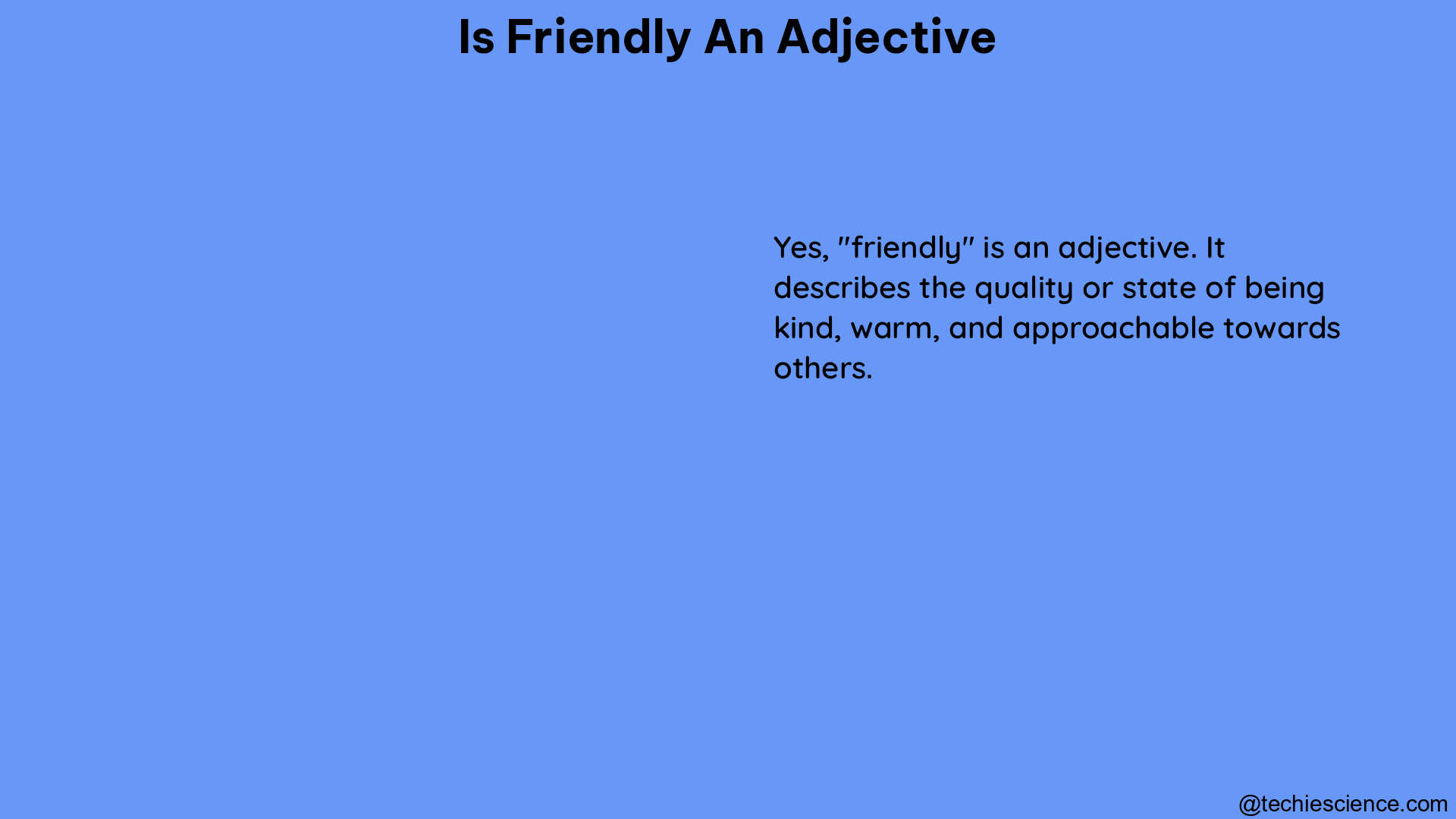Yes, “friendly” is an adjective that is commonly used in the English language to describe a person, place, or situation that is kind, pleasant, and welcoming. The adjective “friendly” can have several distinct meanings depending on the context in which it is used.
Showing Kindness and Goodwill
When used to describe a person or a group of people, the adjective “friendly” conveys a sense of warmth, approachability, and a willingness to engage in positive interactions. For example:
- “The local people are very friendly to visitors.” (Merriam-Webster)
- “a warm and friendly person” (Oxford Learners Dictionaries)
In these cases, “friendly” suggests that the person or people in question are kind, hospitable, and make others feel comfortable and welcome.
Easy to Use or Understand

The adjective “friendly” can also be used to describe objects, systems, or policies that are designed to be user-friendly, intuitive, and accessible. For instance:
- “friendly computer software” (Merriam-Webster)
- “child-friendly policies” (Oxford Learners Dictionaries)
In these contexts, “friendly” implies that the object or policy in question is easy to navigate, understand, and interact with, making it more accessible and inclusive.
Non-Hostile or Peaceful
The adjective “friendly” can also be used to describe situations or relationships that are non-hostile or peaceful in nature. For example:
- “a friendly merger offer” (Merriam-Webster)
- “maintaining friendly relations with all countries” (Oxford Learners Dictionaries)
In these cases, “friendly” suggests that the interaction or relationship is characterized by a lack of conflict, hostility, or aggression, and instead emphasizes a cooperative and harmonious dynamic.
Involving Non-Competitive or Casual Interactions
Finally, the adjective “friendly” can be used to describe interactions or events that are non-competitive or casual in nature. For instance:
- “a friendly match between sports teams” (Merriam-Webster)
- “a friendly argument” (Oxford Learners Dictionaries)
In these contexts, “friendly” implies that the interaction or event is not driven by a competitive spirit or a desire to win, but rather by a more casual and relaxed approach to the activity or discussion.
Grammatical Specifics
As an adjective, “friendly” can be used in a variety of grammatical constructions to modify nouns and pronouns. Here are some examples:
- Attributive Adjective: “The friendly neighbor waved to me as I walked by.”
- Predicative Adjective: “The neighbor was friendly and welcoming.”
- Adverbial Modifier: “She spoke to the customer in a friendly manner.”
- Comparative and Superlative Forms: “The new software is more friendly than the old one.” / “This is the friendliest restaurant in town.”
It’s important to note that the adjective “friendly” can also be used in idiomatic expressions, such as “to make friends” or “to be on friendly terms with someone,” further expanding its versatility and usage in the English language.
Conclusion
In summary, “friendly” is a versatile adjective that can be used to describe a wide range of situations, objects, and people. Whether it’s conveying a sense of kindness and goodwill, ease of use, non-hostility, or casual interactions, the adjective “friendly” is a valuable tool in the English language for expressing positive and welcoming qualities.
References
- Merriam-Webster Dictionary: https://www.merriam-webster.com/dictionary/friendly
- Oxford Learners Dictionaries: https://www.oxfordlearnersdictionaries.com/us/definition/english/friendly_1
- Oxford Learners Dictionaries: https://www.oxfordlearnersdictionaries.com/us/definition/american_english/friendly

Hi…. I am Goutam Datta. I have completed a double M. A. in English and B. Ed. I am a creative writer. Currently, I am a part of the LambdaGeeks.